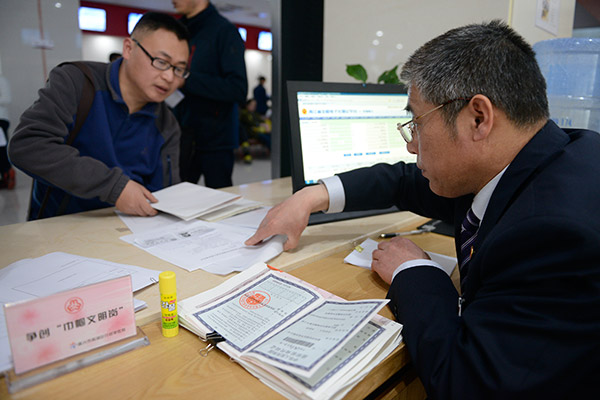Businesses are starting to benefit from latest reforms
 |
|
An official (right) at the streamlined Nanhu District Administrative Service Center assists a client through a multi-departmental application. [Photo/China Daily] |
Businesses in Zhejiang are capitalizing on the province's "At Most One Visit" reform opportunities, which have streamlined investment, settlement and development.
The changes are designed to guarantee the completion of all administrative procedures companies and citizens may need within one center.
As President Xi Jinping calls for greater balance between economic growth and environmental protection, green development is redefining China's industrial market, and Zhejiang has increased the competition.
The ENV New Energy Science and Technology Park is in its first phase of construction in Changxing, Huzhou city.
Focused on global, strategic and high-tech innovative products, the industrial enterprise benefits from Zhejiang's improved administrative system.
Zhu Chen, an officer from Changxing Administrative Service Center, pointed out that ENV has undergone a series of examinations and shortened approval times to "one and half months".
One ENV engineer attributed much of the company's progress and success to the center, saying: "We received great concern and support when initiating and implementing this project."
Overlooking Changxing's Taihu Lake, Longemont Paradise is another large scale, 20 billion yuan ($2.94 billion) investment project integrating tourism, leisure and entertainment, scheduled for completion by the end of 2018.
Xiao Guangfu, chief of the pre-stage development department of the Shanghai Longemont Tourism Investment Co, said the site selection and rapid development of services were provided by Zhejiang's local officers.
"I can't believe how efficiently our examination and approval procedures are being fulfilled," he added.
"Every minute counts with a project like this, and already, the six-star Longemont Diamond Hotel will begin operations by the end of this year-nearly one year ahead of schedule."
Unlike the previous "step-by-step" format, the "At Most One Visit" effectively streamlines various departmental procedures to save what Jiang Weihong, an officer at the center, called an "immeasurable" amount of time.
Officers from such centers are also often stationed in-house at developing enterprises to further increase efficiency between business and administrative services.
Jiaxing's Nanhu district has established a similar administrative examination and approval department, to facilitate small and medium-sized enterprises, or SMEs.
The center is making approval decisions 60 percent faster than the statutory requirement, and has introduced a host of unique industry-focused initiatives.
Although entirely optional, a new electronic certificate integrates business licenses and title certificates for 18 different industries in the region, including food, medical and education.
Speaking at last year's Two Sessions in Beijing, Zong Qinghou, chairman and general manager of China's largest beverage company Hangzhou Wahaha Group, felt that Zhejiang's "At Most One Visit" reform helps increase administrative efficiency.
"As big companies like Wahaha have branches around the nation, we hope Zhejiang's service can be replicated throughout China," Zong said.
As well as advancing nationwide development, the province's new systems have established principles and capabilities for beneficial market growth.
Zhejiang's industrial added value amounted to 1.797 trillion yuan last year, up 6.6 percent from 2011, while the service industry's contribution surged to 51.6 percent.
This was compared to 44.6 percent in 2011, indicating optimization of the industrial sector.
Data from the Zhejiang Statistics Bureau revealed the province's GDP reached 4.65 trillion yuan last year, equaling Turkey, the world's 18th largest economy.
Zhejiang's year-on-year GDP growth hit 7.9 percent in 2016, higher than the nation's 7.3 percent as a whole.
"We expect these reforms will further attract more high-quality businesses to Zhejiang, upgrade industrial structures and consolidate industrial performances," said Zhuo Yongliang, chief researcher of the Research Center of Information Technology & Economic and Social Development, an independent academic institute.
Zhang Xiang contributed to this story



















